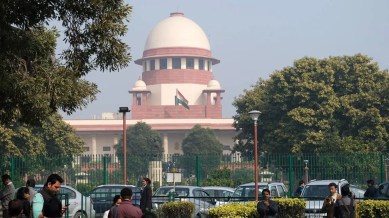Stay updated with the latest - Click here to follow us on Instagram
SC quashes YSRCP’s plea against relaxation of postal ballot norms
The YSR Congress Party moved the Supreme Court after the Andhra Pradesh High Court rejected its petition against the Election Commission's circular.

The Supreme Court on Monday dismissed a petition filed by the YSR Congress Party challenging an Election Commission of India circular which it said had done away with the requirement that Form 13A, which needs to be submitted by postal voters, should be attested, stamped and verified.
“In the facts and circumstances of this case, we do not find any merit in this petition”, a bench of Justices Aravind Kumar and Sandeep Mehta said dismissing the plea challenging an Andhra Pradesh High Court order that rejected the YSRCP petition on June 1.
monthly limit of free stories.
with an Express account.
Appearing for the petitioner, Senior Advocate A M Singhvi said that postal ballots have become critical over the years and sometimes even determine the winner. He said that the Election Commission’s May 30 circular had done away with the requirement that Form 13A should be attested, stamped and verified.
“Now circular says mere signature is enough. Anyone can give a squiggle. Circular says this squiggle is enough,” Singhvi submitted. “The impugned circular comes. It says the rules which have been prevalent in accepting or looking at postal ballots, those rules are waived or changed. This is only for Andhra Pradesh.”
Acknowledging that the counting is to happen on Tuesday, Singhvi added that when the ballots are opened, it has to be with regard to the existing rules, not the circular.
“It is possible that all postal ballots have more than a signature, that they have a stamp, an attestation. They are valid. If there are 10 of them which do not have a stamp or attestation, [they] will be excluded because the rules say so,” he added.
The bench, however, was not convinced.
Singhvi said the high court had refused to intervene saying the election process had already started and that the way ahead would be an election petition.
“There is no point in saying, after the postal ballots have been opened, the polling officer has accepted a squiggle, then it will be challenged in an election petition,” he argued.
The apex court, however, seemed to agree with the high court’s reasoning.
Justice Kumar said, “Accepting all your arguments, ultimately it boils down to what? Improper acceptance of the ballots or improper rejection. In that event naturally Section 100D (of The Representation of The People Act 1951) will step in.”
The provision deals with the grounds on which a high court can declare an election void.
The Supreme Court then went on to dismiss the plea.